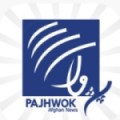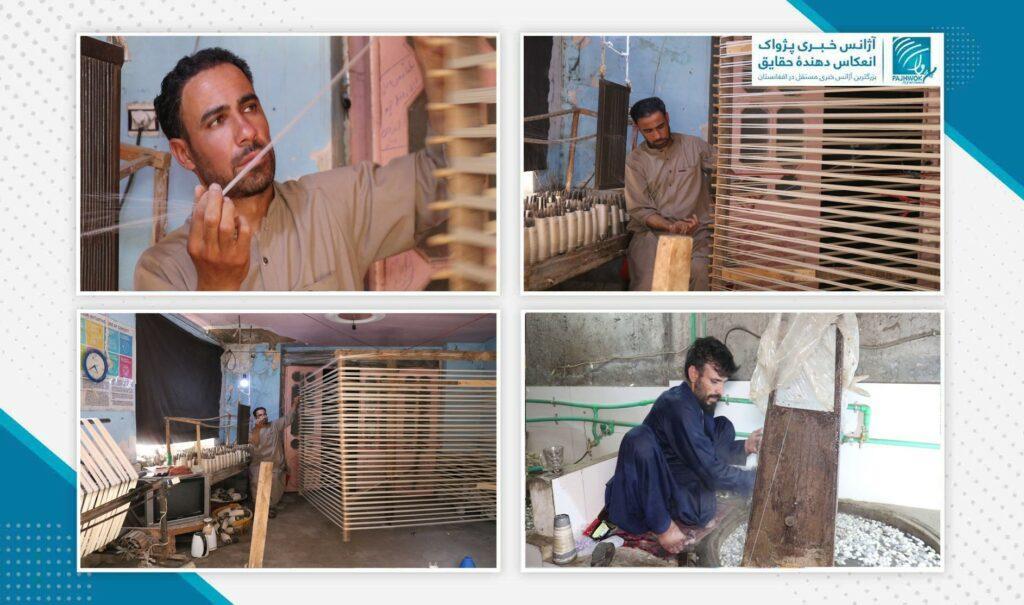
Once Thriving Herat Silk Thread Industry About To Vanish
HERAT CITY (Pajhwok): The once-thriving silk thread industry in western Herat province has nearly vanished, with only one workshop left standing out of more than 250 that once buzzed with life and craftsmanship.
Silk artisans complain about severe stagnation of the market and the indifference of government officials. They say the export of raw materials (cocoons) abroad and the lack of domestic support have brought this historic industry to the brink of collapse.
Mohammad Rafi, 45, a worker at the only remaining silk thread factory who has been engaged in this profession for more than three decades, explained he uses a simple, old-fashioned machine against 300afs per day to transform cocoons into thin, delicate silk threads.
“I have been working in this workshop for more than 30 years against 300afs daily, but the number of workers in this industry is decreasing day by day, so that now only my brother and I are working in this workshop and producing silk thread”.
Mohammad Rafi considers the reduction in wages, the difficulty of work, lack of a sales market, and lack of government support the most important factors behind the industry's recession.
In previous years, more than 3,000 families earned their income solely through the production of silk thread in the province, but now only one small workshop remains, and that too is rarely active, he added.
According to Naseer Ahmad, another yarn producer, he has been working and producing silk yarn for more than 15 years, but due to economic problems and low wages, he works three days a week so that the silk yarn production industry does not disappear.
There are no more silk thread production workshops in the province because most of them have ceased operations due to economic problems and lack of support, he added.
The export of cocoons to the markets of neighboring countries and import of low-quality goods have dealt a severe blow to this industry, currently, showing decline, Naser Ahmad explained.
On the other hand, Abdul Latif, the owner of this workshop and silk thread seller, told Pajhwok he has been earning money through this job for more than 60 years, but now the situation of this industry is worrying.
He said across of the country, there is only one silk thread production workshop operating in Herat; and that too is not very active due to the lack of cheap cocoons and lack of a suitable market for selling.
Previously, more than 25 silk spinning wheels create yarn in his workshop, but now only two machines remain active, he claimed.
Abdul Latif added on the one hand, the price of silk thread in the Afghan market is low, and on the other, their work process is difficult and exhausting.
According to the owner, even though it takes a week to produce one kilogram of silk thread, he is forced to offer it to the market at a price of 5,000afs.
He asked the government to take action to prevent the cessation of the silk production cycle in the province.
However, Agriculture, Irrigation and Livestock Department officials say there are no silk productions and processing factories in the province, and due to the lack of advanced equipment for processing cocoons, this raw material is exported to global markets. They said the department is trying to provide the basis for the expansion of cocooning and silk thread production in cooperation with international institutions.
Fahim Fayez, Director of Birds, Fish and Insects told Pajhwok this year, he distributed more than 6,000 boxes of silkworms to residents of Injil, Guzra and Zindajan districts with the aim of preventing the disappearance of this industry.
Currently, there is only one silk thread production factory, and for this reason, most cocoon producers offer their raw materials to the market at a low price, and traders also sell them to world markets at low prices, but his department is trying to provide the basis for silk processing in Herat, Fayez explained.
Earlier, more than 250 workshops producing silk yarn and fabrics were active in the province, but now only one workshop remains semi-functional. The silk spinning industry, which was considered part of Herat's cultural and economic identity, is facing serious challenges today and is on the verge of complete stagnation due to lack of support.
hz/ma

Legal Disclaimer:
MENAFN provides the
information “as is” without warranty of any kind. We do not accept
any responsibility or liability for the accuracy, content, images,
videos, licenses, completeness, legality, or reliability of the information
contained in this article. If you have any complaints or copyright
issues related to this article, kindly contact the provider above.


















Comments
No comment